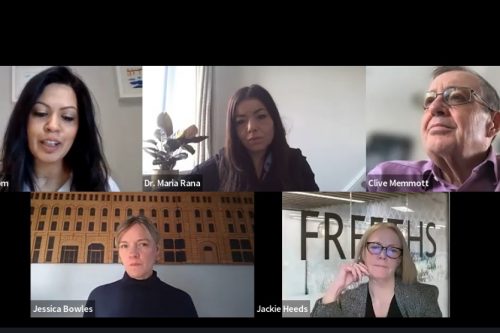What role will the North play in transforming the UK economy?

The Government needs to decentralise the UK’s decision-making structures and invest more in the transport infrastructure and skills if it aims to achieve its ‘levelling up’ ambitions.
That was according to a panel of senior business leaders exploring the strength of the region and the role the North West can play in growing UK plc and the economy in the wake of the Government’s Levelling Up white paper which outlined the government proposals to ‘level-up’ through 12 national “missions” covering areas including economy, housing, education, transport, and

The panel event in partnership with law firm Freeths included Clive Memmott, CEO of Greater Manchester Chamber of Commerce, Jessica Bowles, Director of Strategy at Bruntwood, Dr. Maria Rana, Lecturer in Economics at Salford Business School and Jackie Heeds, Partner at Freeths.
Kicking off the debate was Clive Memmott who said levelling-up needed to be seen as a wider UK ambition.
“This goes well beyond just the North because levelling-up is an issue that’s relevant to huge parts of the country and some of those areas in the South of the country as well,” he said.
“The North West is the engine of the of the North, it’s a significant part of the GDP of the whole of the region.
“We have the highest concentration of net zero potential companies in the region, we have huge strengths in our commercial centre in Manchester, we have the huge power of the universities, life sciences, digital and where digital meets health.
“We’re in a very strong position. Certainly, places like Manchester are showing the most consistent levels of economic growth outside London, but we’ve got to accept it starts at a much lower base.”
Clive Memmott said while the Northern economy was growing, the opportunities will not be maximised without a better-connected North – which means real investment in the region’s transport infrastructure.
“This goes back to the original ‘powerhouse’ concept, that if you join up big cities and create enlarged labour markets, that means you’ve got labour market flow across a much larger area, and of course, also moving into leisure and cultural markets as well.
“So, we need to build a big second economic block outside of the South East. And that’s utterly dependent on hard and digital infrastructure because if you don’t put that in, nothing else is going to happen.”
Jessica Bowles noted the strength of the North West economy can be attributed to the many sectors coming together in particularly in the conurbations and in the centre of Manchester.
“We do have strengths that we really need to use to power on the economy such as those around life sciences, health, innovation, advanced manufacturing and materials, digital as well as those strengths that come out of our universities.
“These are areas that we’ve got massive opportunities with.
“But how we industrialise, how we commercialise those strengths, and how we use the capabilities we’ve got across the North West to produce things, to sell things internationally, to really create jobs and opportunity is something that we’ve not always done as well as we could.”
She added: “As a business we’re looking at how we create spaces and allow businesses to take those ideas and really work with industry and in business connected to finance, skills, and networks that allow us to push more of those into the real economy.
“So, we’re not an economy based on services alone, we’re not an economy based on foundational activity or just on public sector jobs, but we’re an economy that is strong because it’s using our IP and our research in ways that deliver products that people want across the world.”
Jackie Heeds said the region had a great foundation for businesses to build on.
“If you look around the regions, there’s lots of different specialisms for example the low carbon work that is taking place in Liverpool, Cheshire and Warrington, we have the nuclear sector in Cumbria and aerospace in Lancashire and manufacturing is huge across the region.
“The very fact that we’ve got proactive councils, educational institutions and strong businesses is a huge strength because when they work together, they work towards a stronger economy.”
She also noted the need for a more devolved powers at a local level.
“The needs of different regions differ from one another,” said Jackie Heeds.
What one place wants, and needs is different on a local level, which means decisions need to be removed from central government.
“There needs to be more devolution and equally, better infrastructure as Clive mentioned. Placemaking is important too so working with stakeholders, with local businesses and local people and getting that feedback with a view to getting the right solution is key.”
Dr. Maria Rana pointed to more investment in skills and more collaboration with universities and business to address the skills gap.
She said: “We have several universities across Greater Manchester so, there is this massive talent pool of graduates and so we should be working towards making sure the universities are providing the students with the skills that are required by the employers.
“To do so, we need to work much more closely with industry than what we have done so far. We must understand and identify the sectors which are the most important for the Greater Manchester economy and based on that develop programmes and identify new skills for our students through better engagement and collaboration with industry.
“We have done a lot over the past 10 years, but we can do much more.”









